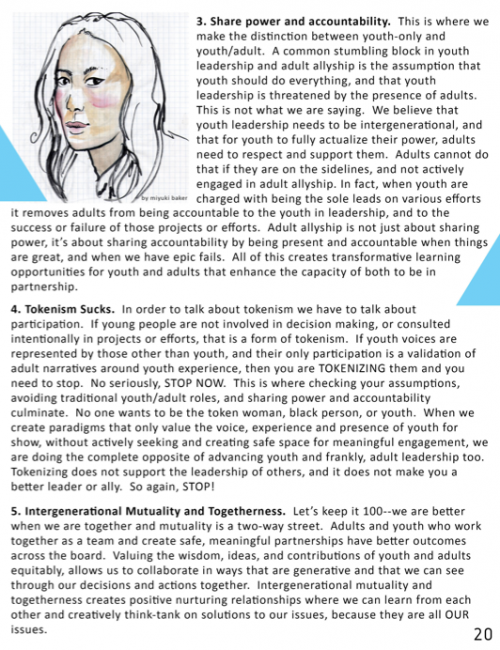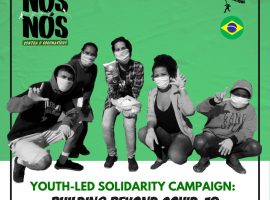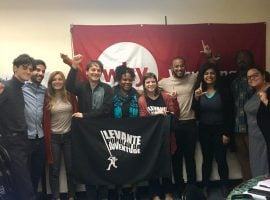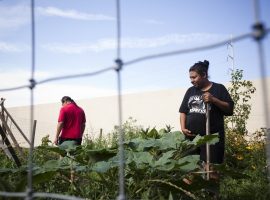Last week, as part of the Food Justice Voices Series, WhyHunger published the first ever Youth Food Justice Zine, which was created by 18 young authors and four social justice activists, one of whom was WhyHunger’s Beatriz Beckford, Co-Director of the Grassroots Action Network. Beatriz’s contributions included an Adult Ally Checklist, outlining how adults can support youth activism, in a meaningful way. You can read Beatriz’s article below, or as part of the zine, which is available as PDF.
Adult Ally Checklist
by Beatriz Beckford
Being an ally to young people is not unlike being an ally to other historically marginalized groups. It takes a deep commitment to being intentional and developing a practice that is both generative and transactional in our interactions with youth and a deep level of accountability to youth when they are not present. It is not easy work, but the benefits of developing a practice of supporting youth and honoring their wisdom and experience builds a kind of transformational leadership that makes our communities stronger and more sustainable, campaigns more effective, and our lives all the more rich. This adult ally checklist is not an exhaustive list, and can at the foundational level provide a few basic best practices for meaningful engagement with youth and powerful youth adult partnerships.
- Acknowledge and check your assumptions or biases about youth and youth leadership. We all make assumptions. Shaped by our communities, experiences, media, and the information we either have or do not have access to. It is important in any kind of relationship to acknowledge, interrogate and challenge our assumptions, and when we leave our assumptions unchecked they become stereotypes that drive implicit biases and that is DANGEROUS. For example the assumption that young people do not have the knowledge or capacity to be effective and competent creates power dynamics that reduce the role of youth and displaces young people from conversation about issues that directly impact them. So name and check your assumptions, create space for those assumptions to be challenged in partnership with young people, and do this often.
- Avoid and challenge traditional youth and adult roles. Young people are often referred to and or placed in roles that denote less power relative to adults. Teacher/Student, Parent/Child, even Adult/Youth. When we shift from traditional adult power roles and share power with young people, we move from adults as mentors/facilitators and create safer, more meaningful relationships that function as a partnership. Adults as partners are better listeners, supporters, and have greater accountability. In partnership, they are also better aligned with the youth they work with and can facilitate better opportunities for youth to contribute meaningfully.
- Share power and accountability. This is where we make the distinction between youth only and youth/adult. A common stumbling block in youth leadership and adult allyship is the assumption that youth should do everything, and that youth leadership is threatened by the presence of adults. This is not what we are saying. We believe that youth leadership needs to be intergenerational, and that for youth to fully actualize their power, adults need to respect and support them. Adults cannot do that if they are on the sidelines, and not actively engaged in adult allyship. In fact when youth are charged with being the sole leads on various efforts it removes adults from being accountable to the youth in leadership, and the success or failure of those projects or efforts. Adult allyship is not just about sharing power, its about sharing accountability by being present and accountable when things are great, and when we have epic fails. All of this creates transformative learning opportunities for youth and adults that enhance the capacity of both to be in partnership.
- Tokenism Sucks. In order to talk about tokenism we have to talk about participation. If young people are not involved in decision making, or consulted intentionally in projects or efforts, that is a form of tokenism. If youth voices are represented by those other than youth and their only participation is a validation of adult narratives around youth experience, then you are TOKENIZING them and you need to stop. No seriously, STOP NOW. This is where checking your assumptions, avoiding traditional youth/adult roles, and sharing power and accountability, culminate. No one wants to be the token woman, black person, or youth. When we create paradigms that only value the voice, experience and presence of youth for show without actively seeking and creating safe space for meaningful engagement we are doing the complete opposite of advancing youth and frankly, adult leadership too. Tokenizing does not support the leadership of others, and it does not make you a better leader or ally. So again, STOP!
- Intergenerational Mutuality and Togetherness. Let’s keep it 100–we are better when we are together and mutuality is a two way street. Adults and youth who work together as a team and create safe, meaningful partnerships have better outcomes across the board. Valuing the wisdom, ideas, and contributions of youth and adults equitably, allows us to collaborate in ways that are generative and that we can see through our decisions and actions together. Intergenerational mutuality and togetherness creates positive nurturing relationships where we can learn from each other and creatively think tank on solutions to our issues, because they are all OUR issues.







